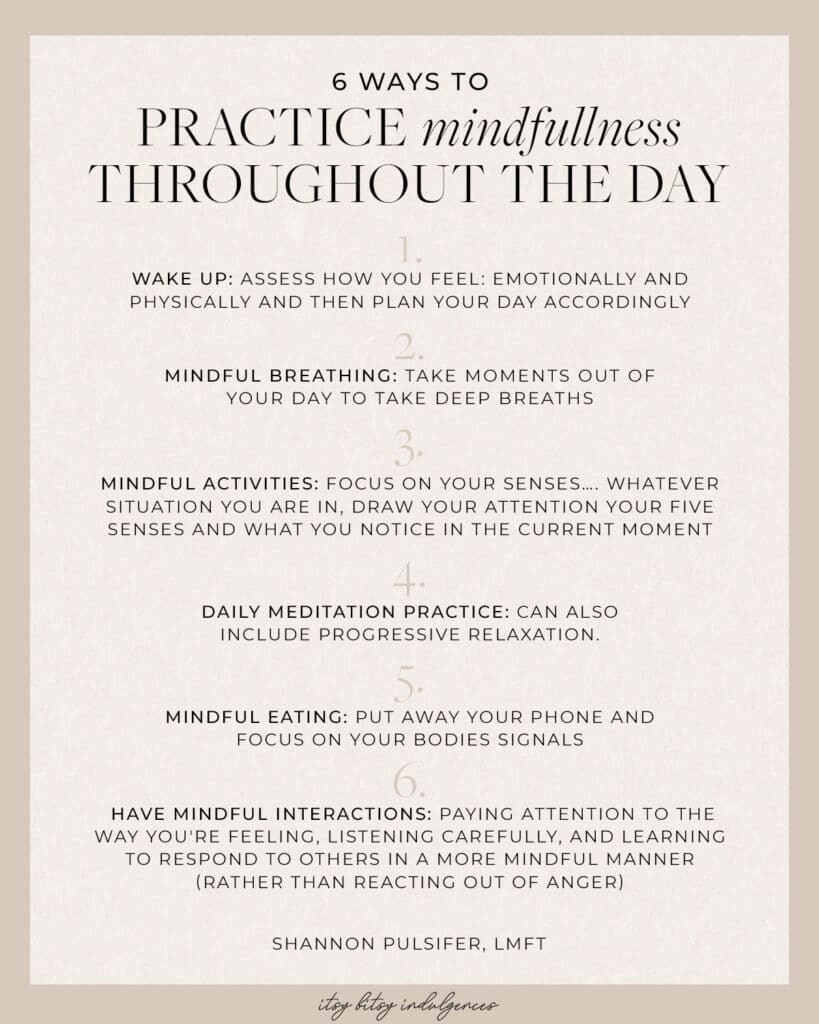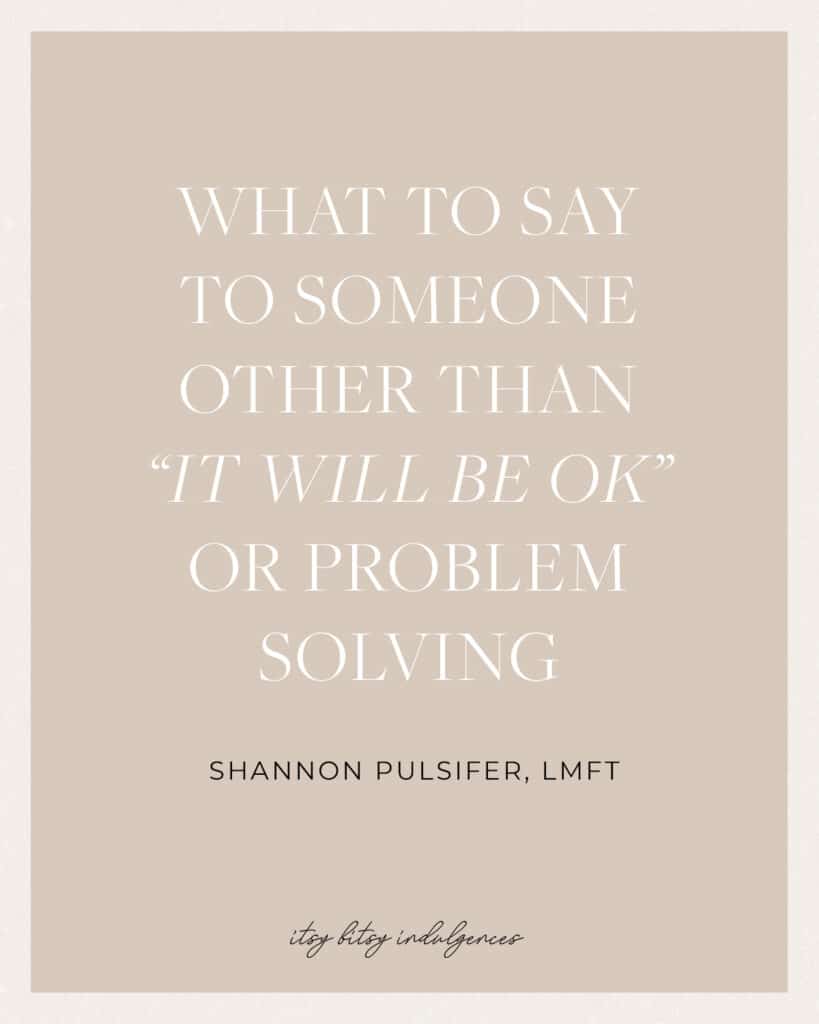
I did a Q+A over on instagram a few weeks ago and a request came in to share some “therapeutic” relationship tips/perspectives on the blog. I opened up the questions for individuals to submit, and that is how today’s post was born.
A few things I want to note about this post:
There are obviously always limitations to what “therapeutic” tips you can offer in a blog post… or even in a podcast, as a guest speaker, and in chatting with friends. Without knowing the intricacies of a relationship, and having a professional working rapport with an individual (i.e. therapist-client relationship) providing tailored answers isn’t possible (or ethical). So today’s answers are broad and general… look for what fits in your life and what you can take from this information and simply leave behind what does not fit.
Secondly, my professional therapeutic work with couples was relatively limited. I did some in my traineeship, and once I went into my internship and post-licensure I worked with families. My work with couples was limited to identifying needs and how those impacted the children and family system as a whole and did not allow for me to conduct strict couple’s counseling. Therefore, many of the questions presented felt a little out of my “scope of practice.” Given that, I contacted one of my close friends, Heather Devine, LMFT, LPCC (we went to graduate school together and are friends in personal life) who is in private practice and works with couples routinely. I felt that some of the questions would be answered best that way. I noted who was answering the question so that people would know (and I added a few things at the end of some of her wonderful responses).
We both hope this information informs, supports, encourages, and helps those who read it.
For those who are looking for a therapist, Heather is licensed throughout the state of CA, as well as Utah, Texas, and Massachusetts. She can provide virtual therapy as well. Here is her clinical practice website.
_______
RELATIONSHIP Q+A
Q: What are some tips on handling the stressors that come to a marriage with a child diagnosed with a serious medical condition.
Heather: It is extremely challenging to go through a trauma in life, and even harder to go through it at the same time as one’s spouse. When an individual in a marriage is experiencing pain and stress, they typically need support from the other. This is difficult when the other person does not have the capacity to give it, because they are experiencing the same pain and stress. It is also typical for each spouse to experience the same stressor but feel it, think about it, and handle it in their own unique way. For instance, it can be frustrating if one spouse needs to talk about it and the other does not want to talk about it at all. It is first important to acknowledge these realities and talk about them together.
Some ways to handle these stressors are to recognize that even though each person is handling the stress in a different way, the couple is still going through the same problem together. This is common ground that each person can understand more intimately than anyone else who is not experiencing this same stress. It is imperative that each individual focus on their own personal self-care and coping skills to help them navigate through the stressors with their child’s medical condition. Self-care can look like, maintaining personal hygiene, exercise, balanced diet, healthy support from friends, etc. Coping skills are any activity that helps rejuvenate an individual. This can be anything from listening to music, to laying under a weighted blanket to taking a bath. It is also imperative that the couple communicate often and clearly with one another. Share your feelings and thoughts with one another and love each other through the pain. Tell one another about the sad feelings or the fears. Do not avoid the topic and distance from one another. Instead become a strong team who holds each other up through the ups and downs. It is also important to ask for what one may need. This could look like one spouse asking to be held close while they cry or asking to help research a confusing part of the health condition. Become a strong bond that fights through the battle together.
When it gets too overwhelming and exhausting, ask for help from others. Utilize a support network that will pick up any slack needed with meals, groceries, running errands, listening to the pain, etc.
Q: Tips on best ways to handle differing parenting styles? How do you find common ground for parenting philosophy?
Heather: Parenting is a very difficult task that can often feel impossible to get “right.” One key thing to remember with parenting is that working with the child and guiding them through life is for the child not for the parent. If it is looked at this way, the common ground is the future of the child. Look for what the child needs to navigate through life based on his or her personality and goals. It is easy to get caught up on making sure we are doing parenting “right,” and miss the needs of our child. Sit with them and listen to their thoughts, emotions, and heart. Build a relationship first before giving direction. Teddy Roosevelt once said, “People don’t care how much you know, until they know how much you care.” This is a great reminder to keep in mind when raising our children.
It can be fun to discover a child’s personality and to pay attention to their strengths and weaknesses. This then, can help parents understand the best communication and discipline style for their child. Some kids respond to time-out and direct guidance very well. Others need a more tender approach that involves listening to feelings and expressing love and support with the guidance given.
It may be helpful to seek marital counseling if it feels too difficult to agree on parenting. It is possible that there are other marital problems that may be hindering the couple’s ability to work together well. One great method of parenting is the “Positive Parenting Program.” There are many therapists who use this method to help parents prevent and treat emotional and behavioral problems with their children. A good resource to find a therapist who is trained in this method is www.psychologytoday.com and use the link for find a therapist.
________
Shannon: Agree with everything Heather says here and also that it’s important for kiddos to see you as a united front. When I would work with families the biggest structural issue I witnessed in the family system was a weak executive subsystem (which is the marital dyad). This often looked like one parent undermining the other, a child being pulled into the marital problems of the parents, etc…
Given that, saving a conversation for how a parent “handled” the situation with the child should be saved for when the parents are in private (this is all assuming the child was not in emotional or physical danger) and able to calmly discuss their differences and share why they might have disagreed, and try to come to a decision that is best for the child (like Heather mentioned above).
A really helpful book is “The Conscious Parent” which helps parents get in tune with their own “issues” that might impact their parenting (and we all let issues from our past, no matter how great our parents were, impact our parenting). Having this level of awareness can also help facilitate meaningful conversation between couples.
Q: Tips for healing after an affair.
Heather: Healing after an affair is extremely difficult and very possible. If the couple is trying to heal together and continue in the relationship, the recommendation is to do individual and couples counseling. A helpful book to work through with a therapist is, “Not Just Friends.” (Shirley P. Glass). The choice to have an affair is 100% the individual’s responsibility, the problems within the marriage are 50/50 responsibility held by each partner. There is often a lot to work through and to heal from when an affair has occurred and seeking professional help is important.
For the individual that has been betrayed:
If the relationship has ended and the individual is working toward healing and moving forward, it is also helpful to get the support of a therapist. Some common areas that come up after infidelity is the rebuilding of self-esteem and, to recover from the intense emotions that come after a betrayal. When a person has been cheated on it evokes shock and a roller coaster of emotions. The person can often feel as though they are going “crazy.” This is due to the fact that what they thought was true and real, really was not. When continuing forward in life after infidelity, it can be hard to feel as though anything is stable and real in one’s life. This is a scary and out of control reality the person must work through and recover from. In order to heal from this, it is important for the person to work toward recognizing what they are in control of and grounding themselves in who they are. It is also important to recognize that the person who committed the betrayal typically chooses this behavior to fulfill a void in their own life and to improve their own inadequacy or low self-esteem. Therefore, the choice typically does not have to do with their partner, it has to do with fulfilling something in their own life that they have not healed from or taken care of effectively to begin with. Lastly, when ready, learning about oneself and any areas of growth that need improvement is an important step toward healing and moving on.
For the person who has committed infidelity:
The work here is to take responsibility for one’s own choice and to begin to work on those hidden parts of oneself that feel shameful or have not been addressed. It is also recommended that this person work with a therapist to help them with their own healing. When couples commit to work through an infidelity and ultimately heal from it, they are typically stronger and more stable on the other side of it. The work to get there is long, difficult, and intense, but it is worth it.
Q: How do I give space to my partner during an argument without getting mad myself?
Heather: There are two areas to always be working on when addressing and confronting issues. Within a relationship we are dealing with our own individual thoughts, feelings, and behaviors, as well as making space for and respecting our partner’s thoughts, feelings, and behaviors. It is challenging to do all of this at the same time.
When in an argument, first focusing on managing one’s own emotions effectively is key. This helps an individual communicate clearly and with respect to their partner. It is important to note that getting angry is not necessarily the problem. It only becomes problematic if the anger becomes under-managed, and harm is being done to one’s partner through violence or verbal assaults. The work here is not to stop anger, but to manage it effectively. Some tools to help with this are mindfulness and self-management or calming tools.
Mindfulness “is a practice of being awake, of participating in your life, of learning to inhabit your life. It is also a practice of becoming more intentional with your actions. This combines two vital aspects of mindfulness: attention and intention. With respect to emotion, it is about becoming more mindful to—aware of—the emotions you experience, as you’re experiencing them.” (Don’t Let Your Emotions Run Your Life, Scott E. Spradlin). There are many resources on mindfulness including books and websites to help with integrating this practice into one’s life. It takes time to develop this skill, but it is extremely effective in helping manage anger as well as any other emotion or distorted thought process.
Self-management/calming tools: Some tools that can be effective are deep breathing, counting to 10, splashing cold water on one’s face, positive self-talk, etc.
The last tool is a communication tool that allows an individual to communicate their experience of a situation with respect and clarity. Once a person has used the self-management tools this allows for clear and concise communication to follow. The format for an “I statement” is:
I feel (Insert feeling)
When you (insert observation)
Because (Insert need)
I would like (Insert preference)
If one can express their experience in a way that does not attack, criticize, or blame others, they are less likely to provoke defensiveness and hostility which tends to escalate conflicts. The goal with this is to invoke healthy communication with one another, not to stifle it.
Q: Advice for newly engaged couples? Any pointers before getting married from a therapeutic perspective?
Heather: First, desiring to build a strong marriage and putting in the effort to do so is admirable. It’s like most areas, where the more effort each partner puts into it, the more they will get from it. Committing to one another to put in that effort and to not slack on one’s marriage will glean positive results. So, learn a lot about each other and about oneself, practice communication tools, ask hard questions, get healthy supportive people all around each partner, be intentional, and have fun.
There are 3 stages that a relationship can move through.
The first picture is showing a relationship that is enmeshed. This typically means that the boundaries within the relationship are unclear. Each individual in the relationship lacks a solid foundation where he or she can manage their own emotions and keep a solid identity even when their partner may be struggling.
The second picture is showing a distant relationship. The individuals in this relationship do not have a bond with one another and they often feel like they are living separate lives.
The third picture is showing a well-balanced relationship. In this relationship each individual has a solid foundation and identity that they continue to develop and manage throughout their life. They also share this solid self with their partner and vice versa, keeping an interdependent relationship going strong. This third picture is the goal to always be striving for to maintain a healthy marriage. This takes intentionality and effort to always be developing yourself as an individual as well as taking care of your relationship. If each person in the relationship is intentional about their own self-care, coping skills and managing their own emotions it provides an environment for a healthy marriage. Then if each person is also committed to communicating honestly and openly with their partner, influencing, and being influenced by their partner, loving, and respecting their partner and sharing thoughts, feeling and needs often with their partner this lends itself to maintaining a healthy marriage. It is a lot of work, but it is also rewarding and fun when each individual is committed to working at it with all of their heart forever. Marriage is not about finding the right person, but it is instead about becoming the right person.
_________
Shannon: I agree with everything Heather wrote here… Gottman also addresses a lot of this need for a deep connection and understanding through the use of “Love Maps“ in his Sound Relationship House theory (click link for a good graphic) which can be summarized by the following statement:
“The couple married for 62 years didn’t stay married because of the absence of conflict, or their enthusiastic sex life, or their good luck. They stayed married because they liked each other. They knew each other.”
Updating these love maps throughout your life helps to solidify the relationship as each person changes over time, and is so easy to do (they have these cards that can help here + here).
Q: Any tips for how I should deal with my husband’s annoyances?
Heather: The best way to deal with areas in our marriage that annoy us is to focus inward into our own thoughts and feelings. We cannot make someone else change or do something the way we would like them. We only have control over our own thoughts, feelings, behaviors, and communication style. However, we can manage our emotions and learn more about ourselves in the process. The mindfulness tool, mentioned above, is a great way to practice this skill. If we spend time with our own thoughts and emotions and identify, without judgment, why we are annoyed, and what thoughts and feelings it evokes, we then have good information about our own triggers. Once we have that information, we then can manage our emotions by using effective coping skills. This could look like, deep breathing, taking a walk, journaling our thoughts and feelings, listening to music, etc. to help calm and manage ourselves. We can also work through our thoughts and learn how to think realistically about a situation instead of getting caught up in cognitive distortions. (https://psychcentral.com/lib/15-common-cognitive-distortions.) Once we have managed ourselves, we then can communicate to our spouse using, “I statements,” as mentioned above. All of these practices are great ways to take care of ourselves, respect our partners and communicate our thoughts, feelings and needs from a place of desiring to improve our relationships. This is good for the individual self and for our partner.
Q: What are your thoughts on scheduling sex?
Heather: Scheduling sex is not necessarily a positive or negative decision. It is extremely important to prioritize sex in marriage. Therefore, if the only way it is going to happen regularly is to schedule it, then schedule it. “A fulfilling sex life is one of the most powerful marital glues a couple can have.” (Sheet Music, Dr Leman). Life is full of countless mundane activities from filling the gas tank, to doing the dishes to changing yet another dirty diaper, sex is a gift that brings excitement and close bonds to the life of a marriage. It can become difficult to find time for intimacy with all the other pressures of life. Because this is the case, it is important to protect the everyday schedule and prioritize time for sex. If one partner dislikes being that intentional with having to schedule sex, then switch off each time, and schedule it some days and make it spontaneous the next. The key is to work together and to communicate accordingly so that both partners are continuously working on providing for one another’s needs in this area throughout their entire marriage. “Sex is vitally important to a healthy marriage.” (Sheet Music, Dr Leman).
Q: How to handle being angry with one another when the children are around?
Heather- It is important to consider the model we are providing for our children when living in our daily lives, so this is a great area to be intentional with. Several of the tools mentioned above are effective in managing through disagreements when children are present. Being mindful of our own thoughts, feelings and behaviors is a great way to manage ourselves effectively. Using “I statements,” and effective coping skills are also important in modeling how to disagree effectively, and even teach our children how to disagree with another person, while remaining loving and respectful. If the argument is getting to a place where it does not feel possible to show love and respect, then taking a time-out and tabling the argument can be an effective tool. To do this, each partner needs to sit down and agree on how this will look before it is put into action. If an individual is getting escalated to a dangerous place where they are feeling like their anger is moving past a 4 on a scale from 1-10 then they need to take a break from the conversation. Anything above a 4 is when the yelling begins, name calling, hurtful phrases, and any type of violence starts etc. It is important to note that it is the responsibility of each partner to take their own break. A partner does not tell another partner to go take a break. When taking a break each person should go to a safe, neutral place and do an activity that is calming, such as reading, journaling, yoga, deep breathing, etc. The amount of time that is taken is typically specified ahead of time; this can be anything that works for the individual couple. For example, 30 minutes or up to 2 hours. When the time has passed, each person commits to meet back at a specified location to resolve the issue. At this time 3 things can occur: the couple resolves the issue using the communication tools mentioned above, they take another break if one or both need a bit more time, or the argument is tabled and both parties agree to work out the issue in therapy or with a qualified 3rd party that is in support of the relationship. Ultimately, it is not necessary or even realistic to never have a disagreement in front of children. It is important for children to see adults disagree in an effective, and respectful manner. This a great area to work on in a relationship.
Q: How to say you’re ready for marriage without an ultimatum?
Shannon: Going off of everything above, it’s important to speak from your perspective: all the things you love about the person, how they make you feel, what you love doing together, and how you would like to see your life moving forward. Ask for their perspective and how they envision your future together. Be specific, be honest, and state what you want. It might look like this (obviously very generic and simplified, but to the point):
“I want to spend the rest of my life with you and get married, how do you see our future going?”
Based on your partner’s answer, you get to make the choice as to whether or not you want to wait, or if you’re ready to move on without them in your life. It should be a conversation about empowering you to say what you want/need, and then make a choice based on the information you receive.
This is a conversation that is best had when both parties are in the position to have a deep and meaningful conversation about the future, likely not in the middle of an argument.
Q: How to prepare marriage for 0-1 baby transition (deeper than “have grace” and “communication is key”).
Shannon: The obvious answers of “give each other grace” and “communication” are critical in the transitional months but there are a few things you can do before baby arrives to try and prepare, which involve open communication:
You can talk about scheduling: how will you manage evening feeding sessions (which depends on how you choose to feed your baby), how will you each get a chance to rest (when will this happen).
What are expectations regarding intimacy after baby arrives? This is a big one and a topic that I don’t think many couples address.
Create a strong marital base, which The Love Maps can really help with (discussed above in the premarital section).
Discuss how you will continue to find times/opportunities to connect emotionally after baby arrives. Will you have at home date nights one a week? Will you go on “out of the house” date nights and what will that look like?
I also want to note that as much as you prepare for what life/marriage will be like after baby arrives, there is another person involved now, who you haven’t met yet (personality wise) and that will need to be taken into account. So flexibility with this plan once baby arrives is crucial as well.
Q: Making time for each other with work, COVID, and 2 little kids.
Shannon: It can feel really hard right now, with all of the life stressors, to find time to connect with your partner. Just as there was a question above about scheduling sex, scheduling in time for you and your partner to reconnect is important, and something that likely won’t, unfortunately, just “happen.” Having a conversation with one another about what this time looks like, and when, can be helpful. Maybe that looks like the following:
If you typically have dinner with the kiddos, maybe having dinner after they go down to bed one day of the week to touch base….
Creating a ritual in the evenings that helps you both connect after the day… maybe that’s a 10 minute conversation as you’re getting ready for bed that touches on a high and low from the day.
On the weekend, maybe it means no television and having an evening where you do something you both enjoy… play a game, take a virtual cooking class, etc, after the children go down.
Obviously very generic ideas, but whatever is unique to the couple will make it special.
________
** Disclaimer: This content is for informational purposes only. It is not intended to be a substitute for professional advice, diagnosis, or treatment. Always seek the advice of your mental health provider with any questions you may have. Never disregard professional psychological or medical advice nor delay in seeking professional advice or treatment because of something you have read on this blog.












